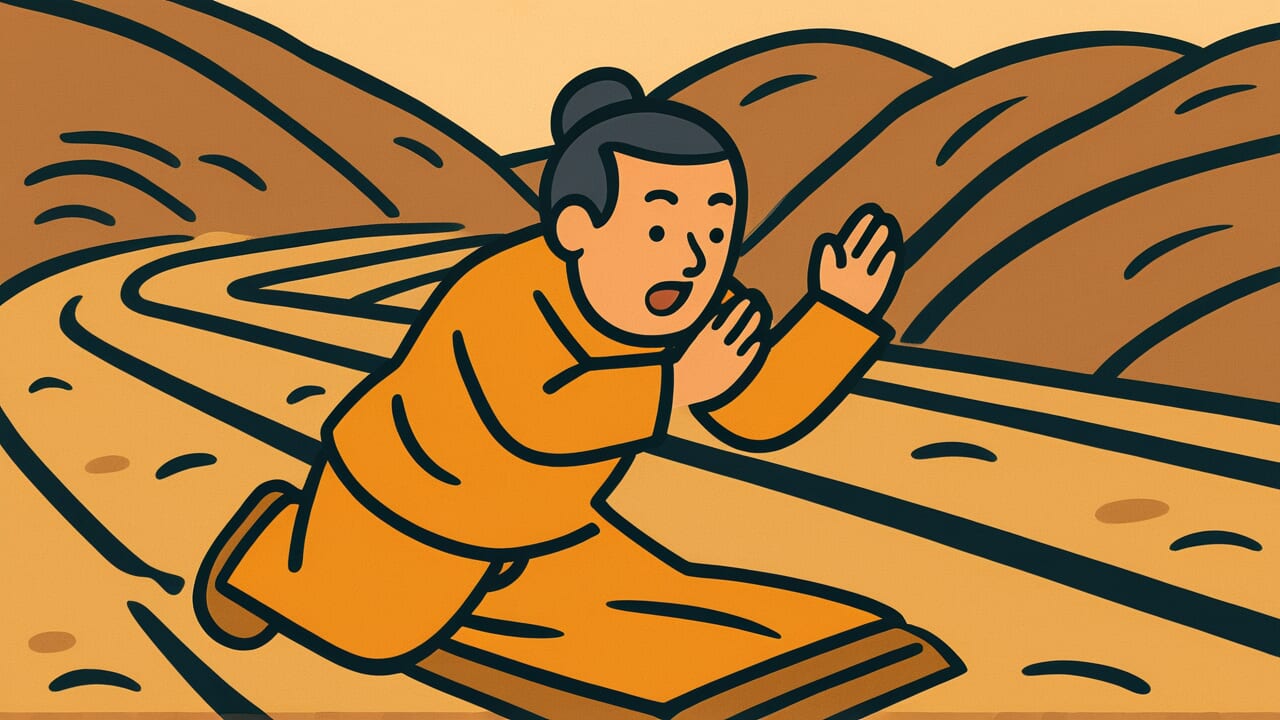How to Read “Slippery roads and sutras are better when fast”
Suberimichi to okyō wa hayai hō ga yoi
Meaning of “Slippery roads and sutras are better when fast”
This proverb teaches that dangerous situations and unpleasant things are better dealt with quickly without hesitation.
When walking on slippery roads, hesitating and taking too much time actually increases the danger.
It’s safer to make up your mind and cross quickly. Similarly, mentally painful experiences like listening to sutras become more unbearable the longer they drag on.
Finishing them quickly brings relief.
Even today, we face unavoidable unpleasant things. These include tackling difficult work, making awkward apologies, or undergoing worrying medical tests.
The more we postpone them, the heavier the mental burden becomes.
This proverb encourages us to stop hesitating and take care of things right now.
By acting quickly with courage, we minimize anxious time. We can restore peace of mind sooner.
This is practical wisdom for daily life.
Origin and Etymology
No clear written records explain the origin of this proverb. However, we can make interesting observations from how the phrase is constructed.
“Slippery roads” refers to paths made slippery by snow or ice.
During the Edo period in Japan, roads froze in winter. People had to walk constantly facing the danger of falling.
Experience taught that crossing slippery roads quickly was actually safer than moving slowly with fear.
“Sutras” are Buddhist scriptures chanted at religious ceremonies. Sutras at funerals and memorial services are important rituals to honor the deceased.
But for attendees, sitting formally and listening for long periods was painful.
Especially on hot summer days or cold winter days, wishing for the ceremony to end quickly was natural.
Combining these two elements expresses different types of things we want to finish quickly.
One represents physical danger, the other mental discomfort.
By pairing a concrete daily experience with a cultural event everyone knows, the proverb memorably conveys a universal teaching.
Unpleasant things are best finished quickly.
Usage Examples
- Tomorrow’s presentation makes me anxious, but slippery roads and sutras are better when fast, so I’ll finish preparing today
- I kept postponing my dentist appointment, but remembering that slippery roads and sutras are better when fast, I called right away
Universal Wisdom
This proverb has been passed down because it contains deep insight into human psychology.
We instinctively want to look away from unpleasant or dangerous things.
But our ancestors learned from experience an important truth. The longer we face fear and anxiety, the more that fear grows beyond reality in our minds.
If you stop before a slippery road thinking “What if I fall?”, your legs freeze and your body stiffens.
This actually makes you more likely to fall.
If you keep thinking “When will this end?” during sutras, every minute feels like eternity. The pain doubles.
The real source of suffering is the “waiting time” before unpleasant things.
Humans have a tendency to transform unknown things and unavoidable pain into something more terrifying in imagination.
Our ancestors understood this mental process and found a simple solution.
Don’t give fear time to grow. Act quickly so fear has no room to expand.
Face reality directly.
This proverb teaches that a moment of courage is a much smaller burden than prolonged anxiety.
When AI Hears This
In information theory, compressing data usually means losing something.
Making images smaller reduces quality. Compressing music files loses sound details.
But slippery roads and sutras are rare exceptions to this rule.
Consider slippery roads physically. On surfaces with low friction coefficients, higher speed means shorter contact time.
This reduces energy loss from friction heat. In other words, sliding faster increases efficiency.
In information theory terms, this is a system where shortening processing time reduces noise (friction loss) in converting input (potential energy) to output (kinetic energy).
Sutras have the same structure. The function of sutras isn’t understanding meaning but accurately reproducing sound patterns.
Chanting quickly preserves the information in phonetic sequences completely.
Fast chanting actually increases concentration and reduces reading errors.
This resembles an ideal communication channel where increasing information transfer speed doesn’t increase bit error rate.
Modern data compression technology determines “what can be discarded.”
This proverb shows a principle: if you identify a system’s essential function, you can design for speed improvement without quality degradation.
5G communication and real-time AI processing aim for exactly this: “information transmission that’s fast but doesn’t break.”
Lessons for Today
For us living in modern times, this proverb offers practical guidance for escaping the “procrastination trap.”
Email replies, difficult conversations, health checkups, tasks we dislike. Our daily lives are filled with small “slippery roads” and “sutras.”
What matters is acknowledging that feeling anxiety and fear is natural, then minimizing the time we’re controlled by those feelings.
You don’t need to wait for perfect preparation. If you wait until you feel mentally ready, you’ll never act.
Rather, the moment you decide “I’ll do it now,” your heart begins to lighten.
This proverb teaches that courage isn’t the absence of fear. It’s choosing to move forward despite fear.
Even on slippery roads, once you take that first step, you’ll definitely reach the other side.
When you look back, you’ll realize something important. The time spent in fear was much longer and much harder than the time spent actually doing it.
What are you postponing today? Remember this proverb and try taking that first step.



Comments